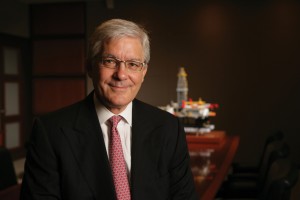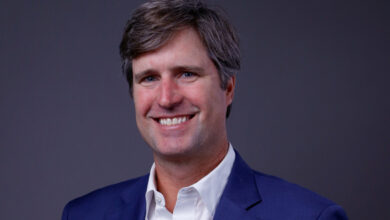A global association for a global industry
By Linda Hsieh, managing editor

If it isn’t broke, don’t fix it. So the saying goes, but Ensco chairman, president and CEO Dan Rabun challenges the notion of maintaining the status quo. Doing something one way simply because “it’s the way we’ve always done it” doesn’t necessarily produce the best results.
So when Mr Rabun joined Ensco in March 2006 as president and a director after a 20-year career as a mergers & acquisitions lawyer, he asked a number of questions about the way things were being done. Is this truly the best approach? How can we think outside the box to improve performance? “I challenged people to consider new approaches that might lead to even better results,” said Mr Rabun, who was appointed Ensco’s CEO and chairman of the Board in 2007. In this respect, his relative lack of knowledge about the contract drilling industry at the time became an asset.
One example of how Ensco took a major step forward, particularly in safety, was a rebranding campaign the company launched soon after Mr Rabun came on board. “We had made great safety improvements, but we had reached a plateau in our performance and were having difficulty seeing a path forward to even better performance. We were saying all the right things, conducting the correct training and everybody had the right intentions, but we were finding it difficult to get to the next level,” he recalled.
He and other Ensco executives came up with an idea for rebranding the company that included the seemingly unimportant task of changing the company uniforms from gray to orange – for the simple reason that orange uniforms make people easier to see on a rig instead of blending them into the background. This change was made over protestations that “our employees love their Ensco gray” and that a rebranding effort would alienate long-time employees.
When the rebranding campaign, complete with new uniforms, signage, vision and values cards, and a corporate video emphasizing the importance of safety and operational excellence was rolled out rig by rig, from New Zealand to the Gulf of Mexico, over the course of one day, “it was obvious that this was one of the best decisions we could make to energize our crews and improve our performance,” Mr Rabun said. “Since that date, our safety performance has improved measurably.”
Another goal of the rebranding was to revitalize the look and feel of the company – making it more attractive to the next generation of workers. “A rebranding may sound trivial, but the retention of our employees has improved as well, and employees now view Ensco as a more progressive company and more attractive to younger employees.”
Globalization
Asking how things may be done “even better” may also help to address the industry’s growing problem with personnel shortages, Mr Rabun believes. “The contract drilling business historically had been a US-centric business, but it is no longer,” he said. A couple of years ago, Ensco moved its headquarters from Dallas to London – a more central location for its global operations. As Mr Rabun describes, the move enhanced Ensco’s image as a truly international company that attracts workers from multiple geographies. “We operate on six continents, and the diversity of our work force is a major competitive advantage.”
IADC
As Mr Rabun begins his term as 2012 chairman of IADC, one of his main priorities is to help the association further its globalization efforts. Although IADC already has a presence in fast-growing markets such as Asia, Brazil, West Africa and the Middle East, he believes more can be done. “Over the next 25 years, these will be growth markets in this business, and IADC needs to be there taking a leadership role on issues like human resource management.”
For example, even though unemployment is high in many parts of the world, drillers are facing increasing challenges to recruit a sufficient number of competent new-hires to crew a growing number of rigs worldwide. By further globalizing itself, IADC will be able to enhance its role in helping the industry address these personnel challenges. “If we can get these chapters in the Far East, Brazil and Africa more actively involved and make them a vibrant part of IADC, we can get the global drilling industry focused on this problem and identify new ways to attract more people to our business,” Mr Rabun urged.
Friendly competitive environment
Whether it’s because of the spirit of collaboration fostered by groups such as IADC or simply because there’s good people in this business, Mr Rabun says he continues to be impressed with the cooperation among drilling contractors. “While we all compete for new business and for talent around the world, it’s an extremely friendly competition,” he said, noting that it’s not uncommon for a contractor to come to the rescue of another if, for example, a piece of long-lead time equipment goes down.
Whether it’s drilling technologies, safety or regulations, in a way we’re all in this together. “We have the same problems, and we can’t address them all by ourselves.” Mr Rabun hopes that, in the coming years, IADC will continue to be the glue for collaboration among contractors. “IADC plays a key role in providing a forum for the whole industry,” he said.

Industry future
Looking to the future, Mr Rabun is unfazed by the industry’s historical cyclicality and believes it remains a fundamentally strong business. “I look at the macro picture. As long as the global economy is growing and the BRIC countries are growing, demand for hydrocarbons will continue to increase. Even the recent global financial crisis – although painful – didn’t slow the oil and gas industry down for long.
“I don’t think we’re going to find ourselves in one of those mid-’80s 20-year slumps. I just don’t see that as a fundamental risk for our business. You will continue to see speed bumps, but they’re not going to fundamentally change the business.”
Ensco, like much of the industry, has made significant investments in more technologically advanced deepwater rigs and jackups and has sold less capable rigs. Mr Rabun notes the company has doubled its fleet size since he joined. The growth of the fleet will continue with two drillships, two semisubmersibles and three jackups still under construction. The company also has significantly expanded the scope of its global footprint, with rigs now in all major markets around the world.
“We’re going exactly where our customers are going,” Mr Rabun said. “If you ask me where I want the business to go, it’s really not my decision. It’s our customers’ decisions, and our customers are going to more remote locations in very deep waters. In shallower water, they’re drilling to much deeper well depths.”
“I’m very proud of what this industry does. Our people regularly work far from their families in remote locations. There is a great deal of personal sacrifice in this business. We perform an extraordinarily valuable service providing energy for the world.”
Mr Rabun was a partner at the international law firm of Baker & McKenzie for 20 years before joining Ensco in 2006. He is a certified public accountant and holds a BBA in accounting from the University of Houston and a Juris Doctorate degree from Southern Methodist University.
He lives with his wife of 33 years, Roxanne, in central London, where they enjoy walking their two dogs and riding their two horses. Their daughter, Christina, lives in Scottsdale, Ariz.





